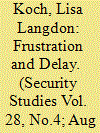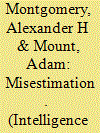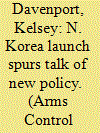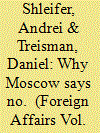| Srl | Item |
| 1 |
ID:
168431


|
|
|
|
|
| Summary/Abstract |
Do trade barriers help slow the spread of nuclear weapons? Supply-side controls on proliferation equipment and material are often dismissed as ineffective because nuclear weapons–seeking states can develop methods to circumvent the controls. However, these global export controls have important secondary effects. By creating barriers to trade, export controls force states to develop costly and inefficient methods that interfere with progress toward nuclear weapons development. Using case evidence beginning with the advent of the Nuclear Suppliers Group’s export control regime in 1974, I argue that the resulting delay and frustration can change leaders’ strategic calculations regarding the value of their nuclear weapons programs. These findings demonstrate that proliferation controls do slow the spread of nuclear weapons, both by delaying existing programs, and by decreasing the likelihood that leaders will make decisions to continue with, or even start, nuclear weapons programs.
|
|
|
|
|
|
|
|
|
|
|
|
|
|
|
|
| 2 |
ID:
110877


|
|
|
|
|
| Publication |
2012.
|
| Summary/Abstract |
The Nuclear Non-Proliferation Treaty is considered the model for how to address the complex problem of proliferation. This article analyzes the NPT's impact on the decision to peacefully give up nuclear weapons programs in four states-South Korea, Argentina, Brazil, and Libya. It concludes that while the nuclear decision-making calculus is complicated, because of the centrality of security concerns in nuclear decision-making, the NPT as currently structured appears not to have had a meaningful impact. This article accordingly suggests that nonproliferation efforts should focus on working directly with problem states to alter their calculations about the utility of nuclear weapons.
|
|
|
|
|
|
|
|
|
|
|
|
|
|
|
|
| 3 |
ID:
131604


|
|
|
|
|
| Publication |
2014.
|
| Summary/Abstract |
Various policy options have been proposed for slowing or halting the spread of nuclear weapons, yet all rely on sound intelligence about the progress of nuclear aspirants. Historically, the United States' record of estimating foreign weapons programs has been uneven, overestimating the progress made by some proliferators while underestimating others. This paper seeks to catalogue and evaluate the intelligence work surrounding 16 of the 25 states that are thought to have pursued nuclear weapons and to provide a framework for evaluating the causes of distorted intelligence estimates of nuclear proliferation. In particular, we identify 12 specific hypotheses related to politics, culture, bureaucracy and organizational culture, then explore how they play out in practice through two case studies (North Korea and Israel). We find that the US has overestimated nuclear programs much more frequently than it has underestimated or correctly estimated them.
|
|
|
|
|
|
|
|
|
|
|
|
|
|
|
|
| 4 |
ID:
119021


|
|
|
| 5 |
ID:
100576


|
|
|